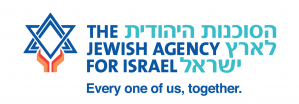Since the outbreak of the pandemic, growing numbers of young Jews on Masa-sponsored internship programs are opting to make aliyah. Employment opportunities, it turns out, are not the only incentive.
San Francisco native Jasmine Lubinsky interns at a Tel Aviv-based startup that specializes in technology-based emergency medical services. The plan was for her to wrap things up by the end of the summer, so she could head back to the West Coast and begin her master’s degree in public health in the fall.
She’s not going back, though. Instead, this 23-year-old graduate of the University of California, Santa Cruz plans to enroll in a similar program offered in English at Tel Aviv University.
“I got here in April, and within a month I knew I didn’t want to go back,” she says. “This is a much easier place to be than San Francisco for someone like me who feels connected to Israel and Judaism.”

That connection deepened, she says, on her Birthright trip to Israel two years ago – the first time she had visited the country since she was a baby.
Ilana Zeigerman didn’t originally plan on a permanent move either. Born and raised in Brasilia, the 27-year-old architect had decided she needed a break from Brazil, where the pandemic was spiraling out of control. She had visited Israel on a Birthright tour six years earlier and knew she wanted to come back, but didn’t have any definite plans. When the construction company where she had been working almost closed down during the global health crisis, she decided this might be the right time.
Zeigerman applied for an internship program in Israel and was hooked up with Optibus, an Israeli startup that produces schedule-optimizing software for public transportation operators. For the past three months, she has worked as a project leader at the company, which raised more than $100 million in a recent funding round.

“It felt so good to be working at something I really enjoyed, and I felt so at home in Israel that I just decided to stay,” she says. “Right now, I’m negotiating a contract with my employers that will allow me to keep my position after this internship ends.”
Lubinsky and Zeigerman are among a growing cadre of Jewish graduates and professionals from overseas who have decided against returning home once their internships in Israel are up. Instead, they are applying for new immigrant status, having concluded that their social and professional prospects are better in Israel.
Mostly in their mid-twenties, they are enrolled in internship programs offered by Masa Israel, an organization that brings thousands of young Jewish adults to Israel every year to study, volunteer and work. It is the largest sponsor of internship programs in Israel, which typically last from several months to a full year.
According to the organization, an estimated 3,000 Diaspora Jews participate in its internship programs every year. In past years, on average, 35 percent would stay on after their programs were over and make aliyah. However, since the outbreak of the pandemic, their share has doubled to 70 percent.
Segueing to Israel
“Interns in Israeli companies have the opportunity to jump into the deep water right at the start, as opposed to their counterparts abroad who typically begin at the bottom of the totem pole,” says Masa CEO Ofer Gutman. “But what we have seen since the outbreak of COVID is that many young Jewish adults from around the world sense that their career opportunities have narrowed and they’re looking for other options.”
Rather remarkably, quite a number of them have left paid positions abroad to take on these internships, which are not only unsalaried but require participation fees. Some Masa interns must, therefore, dip into their personal savings to finance their adventure.
According to Elan Ezrahi, who served as Masa’s first executive director when it was founded in 2004, promoting aliyah was never the organization’s prime mission.
“It’s not that we wanted to discourage aliyah, but we didn’t see this particular project as a vehicle for it,” says Ezrahi, who teaches graduate courses on Jewish world affairs at the University of Haifa. “The original idea was to provide young Jewish adults with impactful experiences in Israel so that they could be more committed Jews, wherever they were.”
He notes that young professionals from certain countries – primarily France, Russia and Ukraine – have long seen Masa programs as an opportunity to segue into life in Israel rather than a short-term, living-abroad experience.
But if this trend is spreading to other countries like the United States, he says, “that would be very interesting.”

A case in point would be 24-year-old Philadelphia native Daniel Loevy, who grew up in a home he describes as “not particularly Zionist” where Jewish life consisted of attending synagogue on the High Holy Days and having a bar mitzvah. After graduating from Penn State with a degree in engineering, he accepted a job at a manufacturing plant in central Pennsylvania, but did not particularly enjoy the work. Thinking that fintech – businesses that use technology to improve or automate financial services – might be a better fit, he began exploring other options. The coronavirus pandemic struck right in the midst of his job hunt, leaving him more or less unemployable.
“I had been to Israel on Birthright a few years earlier and knew I wanted to come back one day,” he recounts. “I also knew that Israel was a world leader in fintech, ahead of the United States even, so it was like this perfect alignment of the stars.”
Since December, Loevy has been interning as a strategic consultant at Equitech Financial Consulting in Tel Aviv. He began the job remotely, working from his home in Philadelphia (“I wanted to hit the ground running”) and landed in Israel with his Masa group in April. “Even before I came, I knew this was going to be a permanent move,” he says. “This internship was basically my soft entry into Israel.”
Loevy’s program ends in September and he has already negotiated a deal with his employers to stay on as a salaried consultant after that. He plans to apply for aliyah as soon as his internship is over.
“It wasn’t only a matter of Israel being a great place for me to build my career and establish a network,” he explains. “It also has to do with me feeling very connected to the Jewish people and at home here.”

The Tel Aviv factor
This was a recurring theme in conversations held over the past week with a group of Masa interns who had decided to stay on. Another draw for them was the success of Israel’s vaccine rollout program, which allowed the country to emerge from lockdown before the rest of the world (though infection rates in Israel have risen dramatically in recent weeks due to the delta variant).
“The situation here was exponentially better than in any of the countries we came from,” Lubinsky notes – including countries like Brazil, where Zeigerman says she can’t even imagine how long she would have had to wait for a vaccine had she stayed there.
All Masa participants who are not vaccinated get jabbed soon after they land in Israel.
There was no mention in these conversations of the issues that often concern their Israeli peers: the prohibitively high cost of living in the country, for example; the ongoing conflict with the Palestinians (and absence of any solution on the horizon); the deepening religious, ethnic and social divides in society; and the fragility of Israeli democracy.
For several of them, the appeal of Tel Aviv was a critical factor in their decision to remain. “I’m not sure I would be making aliyah had I landed in a different city,” Lubinsky admits.

Milton Fidel, 23, arrived in Israel from Uruguay on a one-way ticket. “I knew I was coming to stay,” he says.
Born in Argentina, he grew up in a Uruguayan beach town but after graduating from university this past December, wanted to give city life a try. “Rather than move to Montevideo, I figured I’d come to Tel Aviv,” he says. “It sounded a lot more exciting.”
Three months after graduating with a degree in business administration, he was interning at Drive TLV, an innovation hub in Tel Aviv that hosts and promotes smart mobility startups. His employer won’t be able to provide him with a salaried position come September when his internship ends, he says, “but they promised to help me find another job.”
For Fidel, the transition to life in Israel was relatively easy because he already had family in the country. “My older sister came last year on Masa, and she ended up staying as well,” he says.

Jaime Erlam, 25, isn’t ready to commit just yet. A former Uber executive from Mexico City, he is interning at the same company as Zeigerman, and is still undecided about where he sees his future. “Ideally, I would live in both places – Israel and Mexico. But as it looks right now, I’m probably not here to stay,” he says.
Before the pandemic, Erlam had managed a staff of seven employees focused on servicing big chain restaurants. When the global health crisis hit Mexico, they all got fired and he was left alone. “I decided that I needed to get out of there and make a big change in my life – so here I am,” he says.
For the meantime, he adds, it has been a welcome change, even if not a permanent one.


